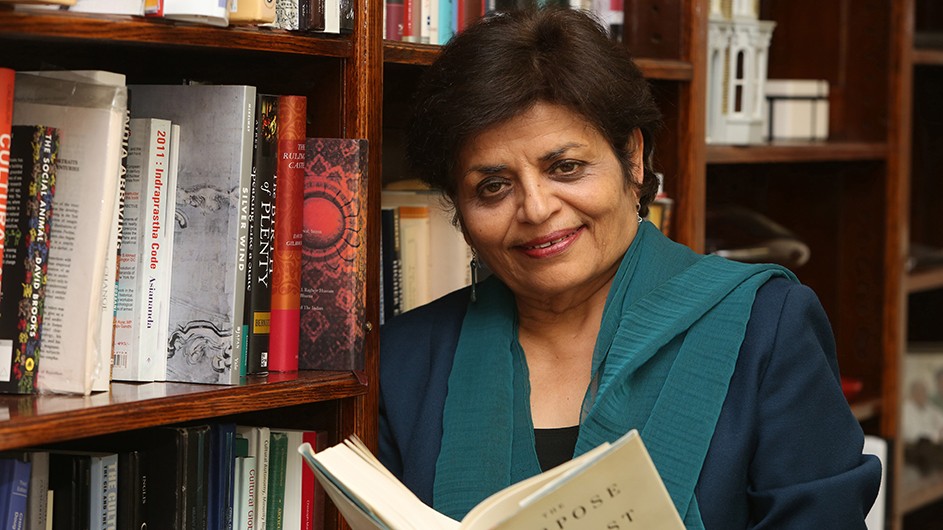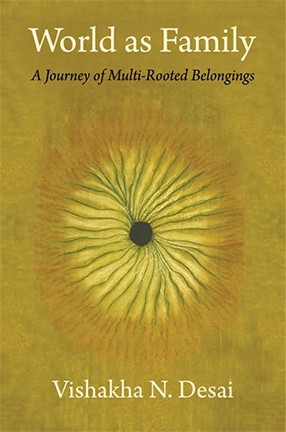So You Want to Live Globally?
In her new book, “World as Family,” Vishakha Desai will show you how.

Vishakha Desai, senior advisor for global affairs and a SIPA research scholar, uses her life experiences to explore the significance of living globally and its current urgency in her new book, World as Family. She weaves her narrative arc from growing up in a Gandhian household in Ahmedabad, India, to arriving in the United States as a 17-year-old exchange student and her subsequent career as a dancer, curator, institutional leader, and teacher.
Through her personal story, set against the broad sweep of political and social changes in the two countries she calls home, Desai reframes the idea of what it means to be global by considering how to lead a life of multiple belongings without losing local and national affinities.
Desai discusses the book with Columbia News, along with which books she’s currently immersed in, how she plans to spend her summer, and who she would like to entertain at a dinner party.
Q. Why did you write this book?
A. The idea for the current form of the book evolved through my conversations with young people—graduate students at Columbia, both in SIPA and at the Committee on Global Thought, as well as exchange students I have met throughout the world as the Chair of American Field Service International programs. Even though many of them think of themselves as global natives, there is a persistent anxiety about how to live in local, national, and global settings simultaneously.
Their questions and quests to find a center in the middle of these ever-expanding circles led me to think about why and how I became so passionate about things global, and about living with a global consciousness without giving up a sense of rootedness. World as Family is, in a way, an excavation of details in my life, as well as a chronicle that can suggest a path to navigate the multidimensional aspects of our lives today and in the future. By telling a personal story, I wanted these discussions to be rooted in experiences, not in abstractions.

Q. How have the events of the past year made the idea of living globally more urgent than ever?
A. I realize that for many of my colleagues and friends, the argument for living in a more fluid, expansive environment of belonging feels too idealistic, or too aspirational in a world that is filled with anti-global rhetoric on the right and the left. There is a strong sense that global is truly antithetical to national identity and local rootedness. While I acknowledge that the challenge is real, COVID and the persistent climate crisis remind us in a visceral way that the world is more interlinked and interdependent than ever. As I say in the book, the Coronavirus reminds us that no matter where we are, and who we are, the pathogens of the pandemic will affect our bodies the same way. My dancer friend Faustin Linyekula once said, the world lives in our body.
The idea of living globally means that we embrace being part of a world of 7.7 billion people. The Indian phrase “treat the world as family," from a Vedic text dating to 1,000 BCE, is curiously apt for our times. In a functional family, we learn to see ourselves as independent beings, but also as part of a larger unit. It means showing up for each other on difficult as well as celebratory occasions, along with letting go of grudges for the sake of the family unit. Ultimately, being part of a family means learning to cherish our independence in the context of our interdependence. Let’s face it: Our global family is pretty dysfunctional at the moment, and in serious need of repair and healing. COVID teaches us that no one is safe until everyone is safe.
Q. What have you been reading lately, and what are you going to read next?
A. I have been reading Isabel Wilkerson’s Caste, and I just finished my colleague Manan Ahmed’s new book, The Loss of Hindustan. On my desk are The Next Enlightenment: Reimagining Consciousness, Wealth, and the Future of Humanity by William Bissell, and The Free World: Art and Thought in The Cold War by Louis Menand. I love reading fiction, but there hasn’t been much time lately, so I have been carrying around Homeland Elegies by Ayad Akhtar, which I hope to finish soon.
Q. What are your summer plans?
A. I canceled eight international trips last year, so I am keen to travel again, but long flights will have to wait for a while. We will have a reunion of the U.S.-based Desai family, which has now grown to 22 people, ranging in age from 2 to 78. And I am looking forward to having time to read and cook, along with various virtual programs for the new book.
Q. You're hosting a dinner party. Which three scholars or academics, dead or alive, would you invite, and why?
A. Coming from India, a dinner party with just three people would never qualify as a party! Also, my dinner party would never be limited to academics or scholars. I would also invite artists, political leaders, and activists.
But if I must limit myself to three scholars, I would like to invite W.E.B. Du Bois, Romila Thapar, and Edward Said. Each has been seminal in my thinking about the life around me. From Du Bois, I learned about double consciousness, which is necessary for all of us who live in multiple worlds, whether we are Black, Brown, or White. Romila Thapar, the eminent Indian historian, has been important in my understanding and interpretation of not just the history of the Indian subcontinent, but also the political dimensions of interpretation of the past in the present. Said’s book, Orientalism, and his thinking about the paradoxes of citizenship, his life lived between two worlds, and his passion for thought and music have helped me in living a life of multiplicity and seeming contradictions.
All three of them (Thapar is still alive) are original thinkers, and were pioneers in rethinking the world they found themselves in. It would be quite amazing to witness how they would talk to one another. I am sure that they would find each other stimulating!
Check out Books to learn more about publications by Columbia professors.